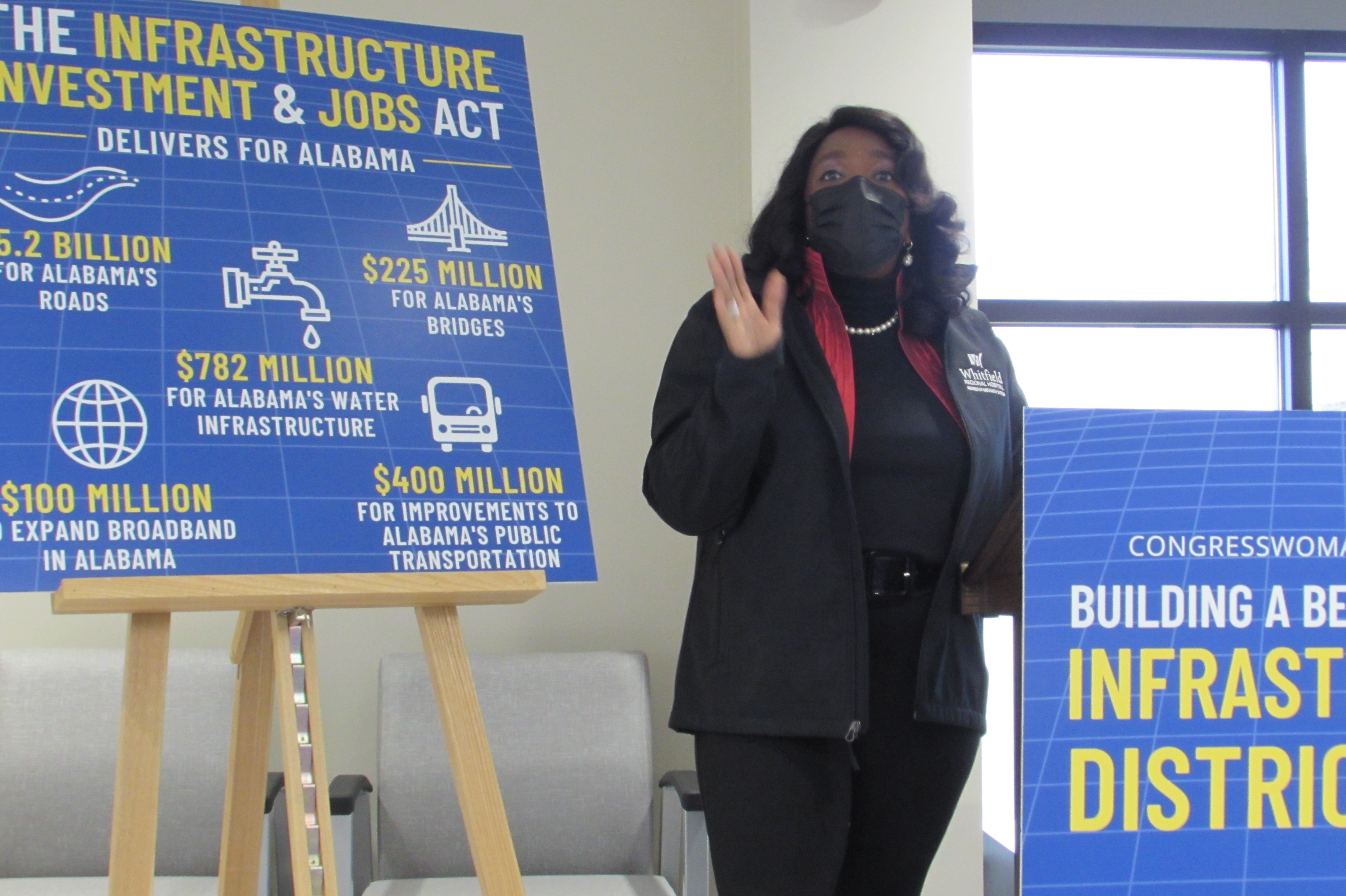Sewell explains infrastructure bill to crowd at WRH
With her signature effervescent delivery, U.S. Rep. Terri Sewell started the third day of her “Building a Better Alabama” Infrastructure District Tour with a stop at Whitfield Regional Hospital in Demopolis.
The congresswoman is making her annual visit to all 14 counties in the 7th Congressional District to highlight how the funding from the $1.2 trillion bipartisan Infrastructure Investment and Jobs Act will impact Alabama. The visit to Demopolis and to Livingston on Tuesday was her last before the Christmas holidays. She will continue her tour after the first of the year.

Sewell’s press conference took place in the soon-to-be-opened front lobby of WRH, the first event in the renovated area. So new is the lobby that many of the chairs set up for the event still had tags hanging from them.
The congresswoman spoke before an audience made up primarily of hospital employees. As part of her talk, Sewell reviewed the healthcare provisions in the Build Back Better Act.
Praising the hospital, and especially the staff and front-line workers, Sewell told the crowd, “To think we almost closed this facility, that things were so bad, I cannot believe all the wonderful progress.”
She also wanted to see how WRH used the $4.3 million in CARES funding it received from Congress when COVID-19 first hit. The money helped health care facilities, including WRH, cope with the unprecedented demands created by the pandemic.
Rural hospitals across the nation are under threat,” she told the crowd. She is working to make sure those hospitals receive equitable and fair distribution of funding to make it possible for them to continue operating.
“I know what’s possible when we work together,” she said. Sewell pointed out the cooperation between the City of Demopolis and Marengo County and the partnership between UAB and WRH.
“I may be a Democrat, but we have to put partisanship aside when it comes to the delivery of healthcare services — affordable, quality healthcare services,” she said.
Politics also must be put aside when it comes to dealing with the deferred maintenance on the country’s roads and bridges, she added, “It’s about the people we represent, not the party.”
The bipartisan Infrastructure Investment and Jobs Act, what she called the largest investment in the nation’s infrastructure in nearly a century, passed because legislators on both sides of the aisle worked together. Compromises from both Democrats and Republicans made it possible to secure enough votes. Republicans pressed for block grants to the states. Sewell said she would have preferred doling it out to cities and counties as the funding for the American Rescue Plan.
The part of the package bringing $100 million to Alabama for broadband was a bill that Sewell sponsored.
Rep. Sewell, the only Democrat in the Alabama Congressional Delegation, was the lone member from the state to vote in favor of the bill. Although spoken it in a joking manner, Sewell wasn’t kidding when she said that she will demand ALDOT focus on the issues in her district before those districts represented by members of Congress who didn’t support the infrastructure bill.
“I was the lone person to vote for it, you’re [right] I want our priorities in Alabama’s 7th Congressional District to take priority,” she demanded. “Do ours first.”
When it comes to making sure west Alabama is included in the distribution of infrastructure money, Sewell stressed, “We have to go to the state and demand our fair share. It’s about accountability.”
Over the next five years, the law will provide the following to Alabama:
- $5.2 billion for federal-aid highway apportioned programs
- $225 million for bridge replacement and repairs over the next five years
- $400 million for improvements to Alabama’s public transportation
- $100 million to connect every Alabamian to high-speed internet
- $782 million to improve Alabama’s water infrastructure
Sewell denied the concerns that the costs of the infrastructure bill will plunge the country into further debt. As a member of the House Ways and Means Committee, she sat in on negotiations that made sure the legislation is fully paid for.
“I sit on the committee that has to pay for it, that has to raise the revenue,” she said. “Nobody wants us to have infrastructure on the back of future generations. We want to make sure we’re doing our part to be fiscally responsible as we also invest in our greatest resource, which is our people.”
She has served under three Presidents, all of whom have stressed the need for investment in upgrading America’s infrastructure.
“The fact that Biden and that we all – Republicans and Democrats on the Senate and House side — got this across the finish line is awesome,” she said. “This is an opportunity to really make transformational change.”

